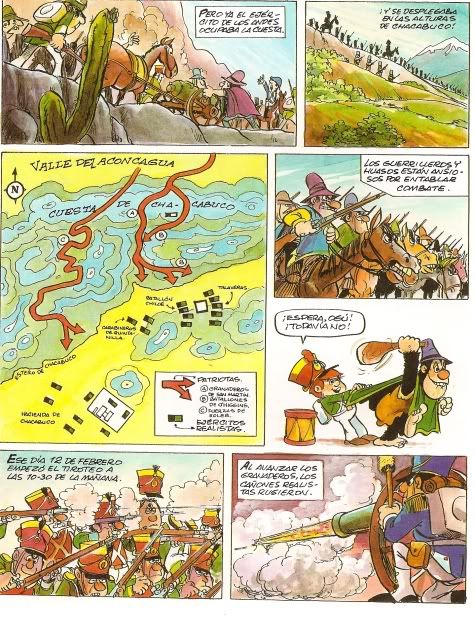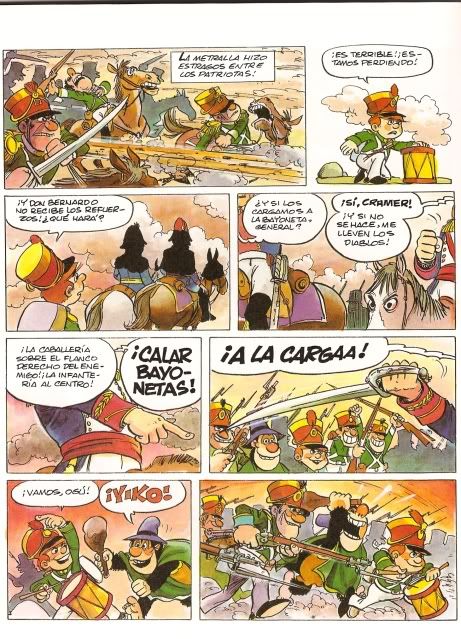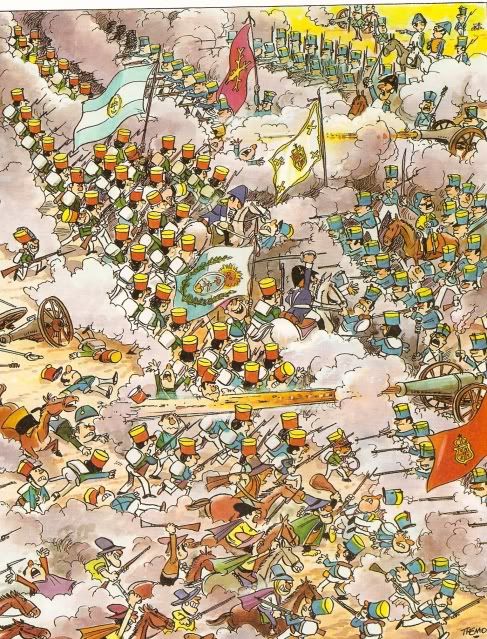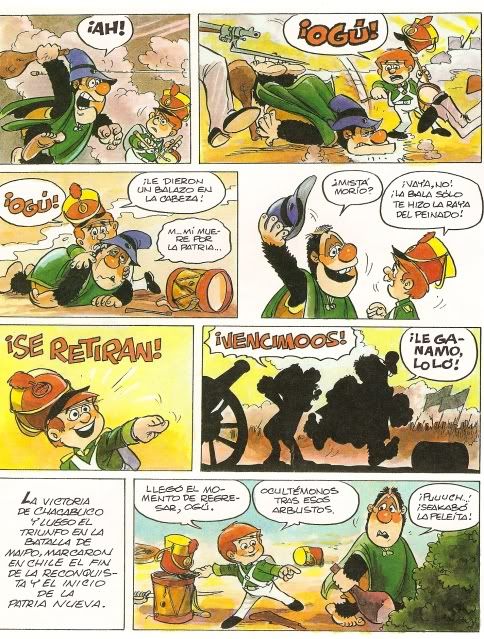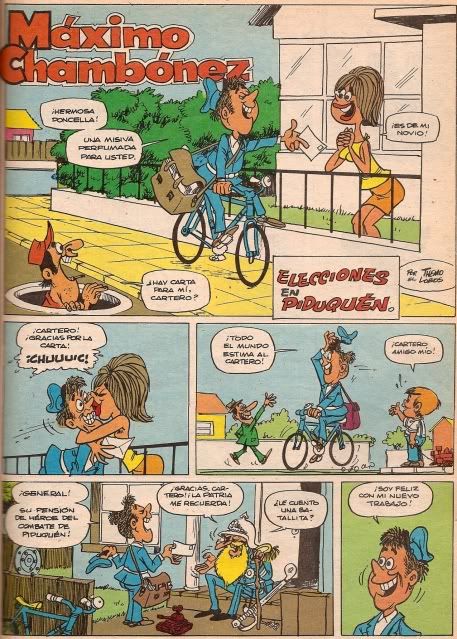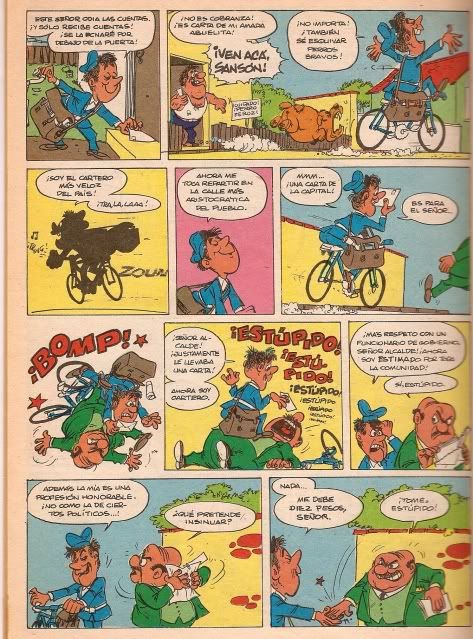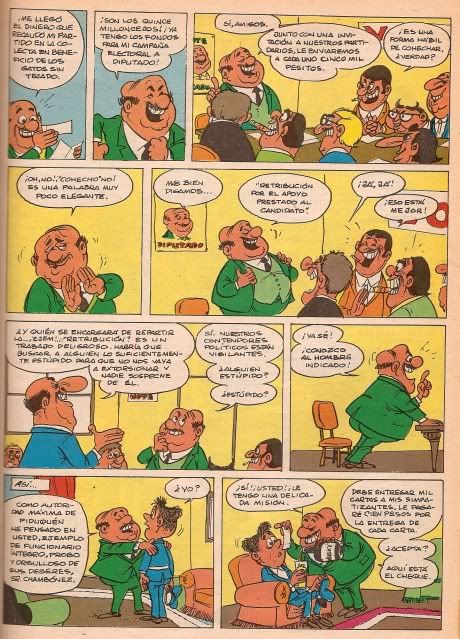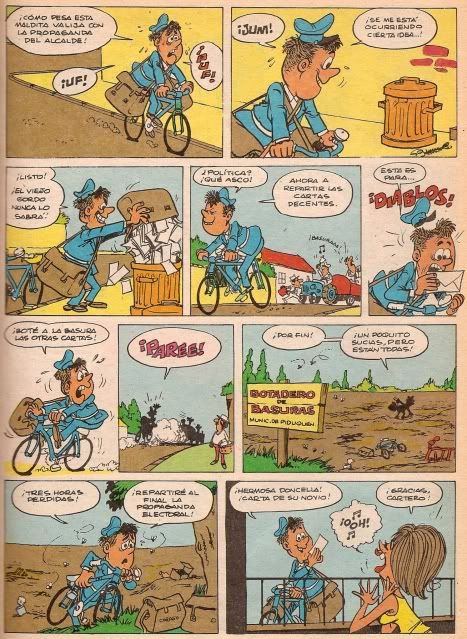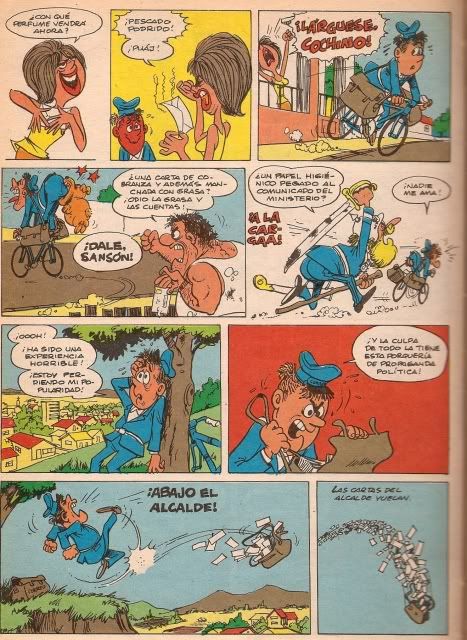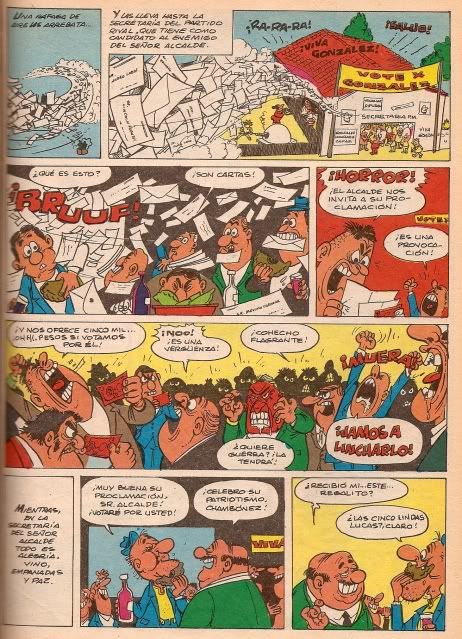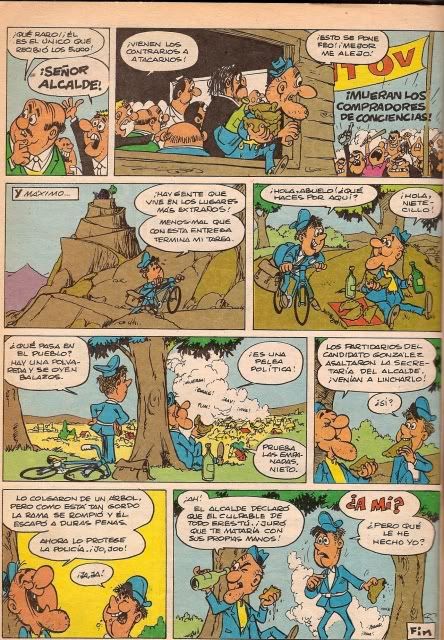Thursday 23 December 2010
Book by book: J. G. Ballard's bibliography
Monday 20 December 2010
The comics of my youth #6
Thursday 9 December 2010
The remote edges #16
Tuesday 30 November 2010
All top 10
For my Top 10 Books, I will take each work out of my bookshelf, open it at random and type up one paragraph from whichever moment in the book I happen to open it at. I read four of the books on this list in Spanish, so I will transcribe the texts in the original language. This list consitst of short story collections in addition to novels. I will also detail what language the book was written in, what country it is from and what year it was written in.
For my top 10 films, I will open up a Google image search and pick one still from a film that I feel captures the zest and vitality of it. I will detail the language it is spoken in, what country produced it and the year it was released.
Here goes....
Language: English
Country: Ireland
Year: 1917
And while the friends were still standing in tears by the bedside the soul of the sinner was judged. At the last moment of consciousness the whole earthly life passed before the vision of the soul and, ere it had time to reflect, the body had died and the soul stood terrified before the judgement seat. God, who had long been merciful, would then be just. He had long been patient, pleading with the sinful soul, giving it time to repent, sparing it yet awhile. But that time had gone. Time was to sin and to enjoy, time was to scoff at God and at the warnings of His holy church, time was to defy His majesty, to disobey His commands, to hoodwink one's fellowmen, to commit sin after sin and to hide one's corruption from the sight of men. But that time was over. Now it was God's turn: and He was not to be hoodwinked or deceived. Every sin would then come forth from its lurkingplace, the most rebellious against the divine will and the most degrading to our poor corrupt nature, the tiniest imperfection and the most heinous atrocity. What did it avail then to have been a great emperor, a great general, a marvellous inventor the most learned of the learned? All were as one before the judgment seat of God. He would reward the good and punish the wicked. One single instant was enough for the trial of a man's soul. One single instant after the body's death, the soul had been weighed in the balance. The particular judgment was over and the soul had passed to the abode of bliss or to the prison of purgatory or had been hurled howling into hell.
#9 La vida breve (A Brief Life) - Juan Carlos Onetti
Language: Spanish
Country: Uruguay
Year: 1950
Me aparté y retrodecí; recordé que habíá alguien al otro lado de la pared, admití el deber de llamarlo para que viera lo que yo habíá mirado. "Ellos" ya no estaban; habían ocupado totalmente el cuerpo de la Queca en el momento decisivo, gotearon como un sudor después de la muerte, se disolvían ahora mezclados al polvo y la pelusa de los rincones. Pero el aire de la habitación, la libertad y la inocencia, se alzaban como un vapor en el alba, alegres y silenciosos reconocían la forma de mi rostro.
#8 The Unlimited Dream Company - J. G. Ballard
Language: English
Country: United Kingdom
Year: 1979
Later, while I rested in my bedroom above the river, I thought of my third vision that afternoon, of my lordships of the deer. Although I had not eaten for three days I felt gorged and pregnant, not by some false womb in my belly, but by a true pregnancy in which every cell of my flesh, every gland and nerve in my brain, every bone and muscle, was swelling with new life. The thousands of fish crowding the dark water, the lantern-like plumage of the birds in the park also seemed gorged, as if we were all taking part in an invisible reproductive orgy. I felt that we had abandoned our genital organs and were merging together, cell to cell, in the body of the night.
#7 The New York Trilogy - Paul Auster
Language: English
Country: United States
Year: 1987
Unfortunately, the woman's back is turned to Blue, so he can't watch her face as the meal progresses. As he sits there eating his Salisbury steak, he thinks that maybe his first hunch was the right one, that it's a marriage case after all. Blue is already imagining the kind of things he will write in his next report, and it gives him pleasure to contemplate the phrases he will use to describe what he is seeing now. By having another person in the case, he knows that certain decisions have to be made. For example: should he stick with Black or divert his attention to the woman? This could possibly accelerate matters a bit, but at the same time it could mean that Black could be given the chance to slip away from him, perhaps for good. In other words, is the meeting with the woman a smoke-screen or the real thing? Is it a part of the case or not, is it an essential or contingent fact. Blue ponders these questions for a while and concludes that it's too early to tell. Yes, it could be one thing, he tells himself. But it also could be another.
#6 Pedro Páramo - Juan Rulfo
Language: Spanish
Country: Mexico
Year: 1955
"Mi cuerpo se sentía a gusto sobre el calor de la arena. Tenía los ojos cerrados, los brazos abiertos, desdobladas las piernas a la brisa del mar. Y el mar allí enfrente, lejano, dejando apenas restos de espuma en mis pies al subir de la marea..."
- Ahora sí es ella la que habla, Juan Preciado. No se te olvide lo que dice.
"Era temprano. El mar corríá y bajaba en olas. Se desprendía de su espuma y se iba, limpio, con su agua verde, en ondas calladas.
"- En el mar sólo me sé banar desnuda -le dije. Y el me siguió el primer día, desnudo también, fosforescente al salir del mar. No había gaviotas; soló esos pájaros que les dicen 'picos feos', que grunen como si roncaran y que después de que sale el sol desaparecen. Él me siguió el primer díá y se sintió solo, a pesar de estar allí.
"- Es como si fueras un 'pico feo, uno más entre todos -me dijo-. Me gustas más en las noches, cuando estamos los dos en la misma almohada, bajo las sábanas, en la oscuridad.
"Y se fue.
"Volví yo. Volvería siempre. El mar moja mis tobillos y se va; moja mis rodillas, mis muslos; rodea mi cintura con su brazo suave, da vuelta sobre mis senos; se abraza de mi cuello; aprieta mis hombros. Entonces me hundo en él, entera. Me entrego a él en su fuerte batir, en su suave poseer, sin dejar pedazo.
"- Me gusta banarme en el mar - le dije.
"Pero él no le comprende.
"Y al otro día estaba otra vez en el mar, purificándose. Entregándome a sus olas."
#5 Crime and Punishment - Fyodor Dostoyevsky
Language: Russian
Country: Russia
Year: 1866
As for Raskolnikov, during all this time he lay on his back, not saying a word, staring intently, though without any reason that was particularly apparent, at the man who had come in. His face, which he had now turned away from the interesting flower on the wallpaper, was extremely pale and displayed an expression of uncommon suffering, as though he had just undergone a painful operation or had, only a moment ago, been released from torture. Gradually, however, the newly arrived gentleman began to occupy more and more of his attention; this state of attention changed to bewilderment, then suspicion and fianlly something that resembled fear. Indeed, when Zosimov, pointing at him, said 'This is Raskolnikov,' he suddenly roused himself in a hurry, leapt upright, sat on the edge of the sofa and in a voice which was almost challenging, but none the less faint and broken, articulated:
#4 Bestiario (Bestiary) - Julio Cortázar
Language: Spanish
Country: Argentina
Year: 1951
De noche no es tanto, nos ayudan la fatiga y el silencio - porque el rondar de las macuspias escande dulcemente este silencio de la pampa - y a veces dormimos hasta el amanecer y nos despierta un esperanzado sentimiento de mejoríá. Si uno de nosotros salta de la cama antes que el otro, puede ocurrir con todo que asistamos consternados a la repetición de fenómeno Camphora monobromata, pues cree que marcha en una dirección cuando en realidad lo está haciendo en la opuesta. Es terrible, vamos con toda seguridad hacia el bano, y de improviso sentimos en la cara la piel desnuda del espejo alto. Casi siempre lo tomamos de broma, porque hay que pensar en el trabajo que espera y de nada serviría desanimarnos tan pronto. Se buscan los glóbulos, se cumplen sin comentaris ni desalientos las instrucciones del doctor Harbin. (Tal vez en secreto seamos un poco Natrum muriaticum. Tipicamente, un natrum llora, pero nadie debe observarlo. Es triste, es reservado; le gusta la sal).
#3 The Trial - Franz Kafka
Language: German
Country: Check Republic
Year: 1925
But this was not so. The priest examined the lamp instead, turned it up a bit, then turned slowly towards the balaustrade and gripped the squared edge in front with both hands. He stood like this for some time and looked round without moving his head. K. had retreated a considerable distance and was leaning on his elbow against the front row of pews. Dimly he could see somewhere, without being able to tell exactly where, the hunched back of the verger crouching peacefully as if conscious of a task accomplished. What silence in the cathedral now! But K. would have to break it; he had no intention of staying here. If it was the priest's duty to preach at a specified time without regard to circumstances, he could do so. It could be managed without K.'s support, just as K.'s presence would certainly not heighten the effect. So K. slowly put himself in motion, sidled along the pew on tiptoe, came to the centre aisle and walked along without hindrance, disturbed only by the ringing of his cautios steps on the stone floor and by the echo sounding faintly but continuously in regular multiple progression round the vaulted roof. K. felt a little exposed as he walked alone between the empty pews, perhaps observed by the priest; and the church seemed to him to border on the very limits of what was humanly endurable. When he reached the place where he had been sitting he did not stop but snatched at the album he had left there and picked it up. He had almost left the pew area and was almost approaching the open space between this and the entrance doors when he heard the priest's voice for the first time. A powerful, practised voice. How it pierced the expectant cathedral! But it was not directed at a congregation. It was unambiguous and there was no escape; he was calling 'Joseph K.!'
#2 Ficciones (Fictions) - Jorge Luis Borges
Language: Spanish
Country: Argentina
Year: 1944
Debo esa vanidad casi atroz a una institución que otras republicas ignoran o que obra en ellas de un modo imperfecto y secreto: la lotería. No he indagado su historia; sé que los magos no logran ponerse de acuerdo; sé de sus poderosos propósitos lo que puede saber de la luna el hombre no versadio en astrología. Soy de un país vertiginoso donde la lotería es parte principal de la realidad: hasta el día de hoy, he pensado tan poco en ella como la conducta de los dioses indescifrables o de mi corazón. Ahora, lejos de Babilonia y de sus queridas costrumbres, pienso con algún asombro en la lotería y en las conjeturas blasfemas que en el crepúsculo murmuran los hombres velados.
#1 The Sound and the Fury - William Faulkner
Language: English
Country: United States
Year: 1929
I laid out two suits of underwear, with socks, shirts, collars and ties, and placed my trunk. I put in everything except my new suit and an old one and two pairs of shoes and two hats, and my books. I carried the books into the sitting-room and stacked them onto the table, the ones I had brought from home and the ones Father said it used to be a gentleman was known by his books; nowadays he is known by the ones he had not returned and locked the trunk and addressed it. The quarter hour sounded. I stopped and listened to it until the chimes ceased.
5 Runners-up: Lolita by Vladimir Nabokov; Gravity's Rainbow by Thomas Pynchon; Absalom, Absalom! by William Faulkner; Hopscotch by Julio Cortázar; The Obscene Bird of Night by José Donoso.
Language: Russian
Country: Russia
Year: 1966
 #9 The Producers - Mel Brooks
#9 The Producers - Mel BrooksLanguage: English
Country: United States
Year: 1968
 #8 The Second Heimat - Edgar Reitz
#8 The Second Heimat - Edgar ReitzLanguage: German
Country: Germany
Year: 1992
 #7 The Big Lebowski - Coen Brothers
#7 The Big Lebowski - Coen BrothersLanguage: English
Country: United States
Year: 1998
 #6 The Seventh Seal - Ingmar Bergman
#6 The Seventh Seal - Ingmar BergmanLanguage: Swedish
Country: Sweden
Year: 1957
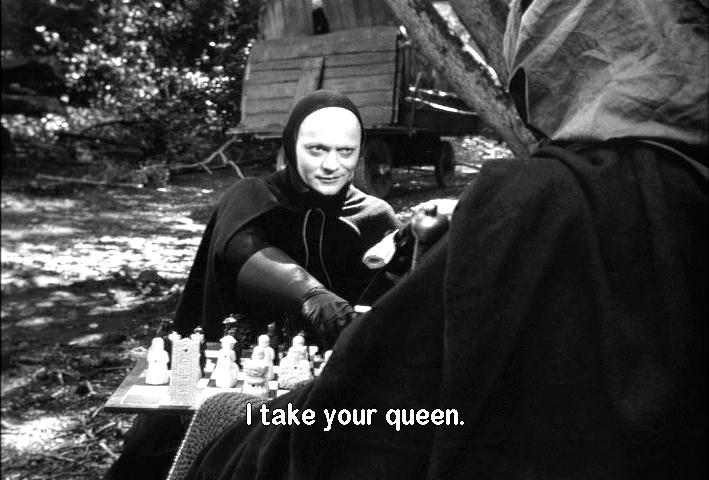 #5 A Man Escaped - Robert Bresson
#5 A Man Escaped - Robert BressonLanguage: French
Country: France
Year: 1956
 #4 Aguirre, the Wrath of God - Werner Herzog
#4 Aguirre, the Wrath of God - Werner HerzogLanguage: English
Country: Germany
Year: 1971
 #3 Alphaville - Jean-Luc Godard
#3 Alphaville - Jean-Luc GodardLanguage: French
Country: France
Year: 1965
 #2 Blue Velvet - David Lynch
#2 Blue Velvet - David LynchLanguage: English
Country: United States
Year: 1986
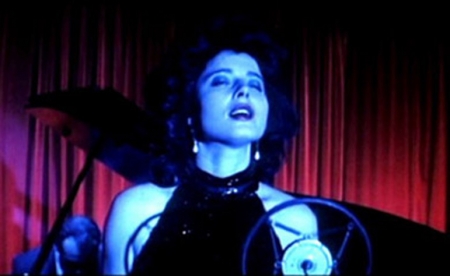 #1 2001: a Space Odyssey - Stanley Kubrick
#1 2001: a Space Odyssey - Stanley KubrickLanguage: English
Country: United States
Year: 1969

5 Runners-up: The Passion of Joan of Arc by Carl Theodor Dreyer; Dr. Strangelove by Stanley Kubrick; La grand illusion by Jean Renoir; Bicycle Theives by Vittorio De Sica; Metropolis by Fritz Lang.
Sunday 28 November 2010
The Unconscious Forces in Julio Cortázar's House Taken Over
Here is a small essay I wrote. Most of it was written, sporadically, over the last few hours, although I had started it a couple of weeks ago.
To read 'House Taken Over' in English click here.
If you think you can have a stab at reading it in Spanish, or if you are bilingual, click here.
I make mention of another story called 'Letter to a Young Lady in Paris', but I could not find the text on the internet.
This essay, I must stress, was written purely for entertainment value and was not submitted for any academic course. I have not proof-read it, nor has a lecturer made modifications to it, so it is a bit rough on the edges.
-----------------------------
When writing a screenplay for an A2 Film Studies assignment, I chose to make an adaptation of Julio Cortázar’s short story House Taken Over. Prior to commencing writing it, a teaching assistant read the story and said (I am paraphrasing here): “The story is open-ended; you could choose to show what it is that throws them out of the house and what happens when they leave it.”
I think that this completely misses out on the point of the story. What expunges the brother and sister out of their own house is their own dreams, fears and obsessions. In the screenplay I wrote I chose to merge it with another story in the collection Bestiary (1951) entitled Letter to a Young Lady in Paris. The story concerns a young Argentine who is looking after an apartment for a woman who has gone away to Paris; he vomits rabbits when he gets anxious and they mutilate the entire apartment. I added it in as a dream sequence (which was re-titled Letter to a Young Lady Who is Also Asleep) to make more explicit the fact that what throws the brother and sister out of their house are unconscious forces that are latent in the house, and they manifest themselves through these muffled sounds and voices.
After I sent my screenplay to a family relative in Chile, who is a university professor and a Cortázar fanatic, he said that implementing the second story into the script makes it clearer that what throws the brother and sister out the house is indeed their collective unconscious. He also said that it is a symbolic and ambiguous representation of the mysterious forces that inhabit the house. The destruction of the vomiting rabbits, he said, is liberation against a reality that has turned oppressive.
Julio Cortázar was a middle-class Argentine, who came to be a prominent figure in what was to be called el boom, a new wave of Latin-American fiction that erupted in the early 1960s. These texts were characterised by their objective realism; ordinary people find themselves in situations which can be surrealistic or uncanny. This genre was soon to be christened magic realism and it led to re-evaluation of previous generation of novelists soon to be heralded as masters, including Jorge Luis Borges, Juan Rulfo and Juan Carlos Onetti.
Cortázar’s role in the Boom was fundamental. The publication of his ambitious novel Hopscotch in 1962 revitalised the literary scene, and the youth of Latin-America became enraptured by it. If 1960s literature was led by the beats in the United States, it was Julio Cortázar who was the most read, admired and discussed author in Latin-America. The popularity of his novel led to an interest in three collections of short stories published in the ‘50s, which had fallen to a silence upon publication: Bestiary (1951), End of the Game (1956) and The Secret Weapons (1959).
The first story in Bestiary is House Taken Over. In this story a brother and a sister live in a large, spacious house and they have an income from a farm, permitting them to wallow in leisure activities. However, menacing sounds appear to emanate from distant rooms and corridors of the house. Eventually, these forces take up the entire house and the unnamed protagonist and his sister Irene are evicted, leaving it in lieu of a new destination.
There is an ambiguity as to what exactly it is that raids their house and evicts them. What is more peculiar is that the characters seem to accept this as it were completely normal; they acquiesce to it, without ever questioning the unusual events.
How is it possible to disentangle this morass of ambiguity and reach an interpretation? Cortázar does imply a great deal in this story, and there is a certain atmosphere that permeates in it which leads me to believe that the raiders of this house aren’t, in fact, people but forces that are implanted in both the house and the characters, alienating them, cornering them and eventually evicting them.
The genesis of the story all the more backs up this viewpoint: its idea came to the author in a dream. Cortázar, in his dream, found himself in a large mansion and was pushed aside from one room to the next until he was evicted from it. He woke up and wrote the story in a single sitting.
Initially, Cortázar sets the story by briefly describing the characters and the house they inhabit. The unnamed narrator and his sister Irene have reached middle age and have never had relationships that have led to marriage: “We ended up thinking, at times, that that [the house] was what had kept us from marrying.” The rest of the house is described and the narrator comments how the ornaments and furniture are covered in dust and that they have neglected this considerable space of the house.
Soon enough, these ‘forces’ make themselves present and the characters huddle to the part of the house they usually frequent. Yes, they are overtaken and disturbed, but try making the situation more tolerable by setting up a new routine. The narrator, with his collection of French literature stranded on the other side of the house, orders a stamp collection, while Irene makes up new patterns for her knitting. The narrator says “It is possible to live without thinking.” However, they are soon so discomforted that these forces that are within them manifest themselves through their dreams.
Cortázar describes in detail the brother and sister’s discomfort while they sleep: “Whenever Irene talked in her sleep, I woke up immediately and stayed awake. I could never get used to this voice from a statue or parrot, a voice that came out of the dreams, not from the throat.” The forces that are present in the house intersect into their dreams or, alternatively, the forces within them intersect into the house. They are clearly anguished by these latent powers, unable to sleep or think clearly.
The collective past of the brother’s and sister’s lives are encapsulated within the house, even to the extent that their belongings, furniture and ornaments come to represent the lives of their ancestors: “It kept the memories of our great-grandparents, our paternal grandfather and the whole of childhood.” Everything about their past life surrounds them, which ultimately leaves them oblivious towards it and they find respite in the quotidian and the mundane: the anonymous character (who shares similarities with the author) spends his days reading French novels while his sister, Irene, knits.
Ultimately, these forces are so overpowering that they appropriate the entire house and the brother and sister are forced to leave. These sounds, even when they come to a closer proximity of the characters, remain indistinct: “You could hear the noises, still muffled but louder, just behind us.” These sounds increase in volume, but cannot be easily distinguished. They take over the part of the house the characters had insulated themselves, and they have no choice but to leave.
Following House Taken Over in Bestiary there is an equally enigmatic and cryptic story, Letter to a Young Lady in Paris. I inserted this story as a dream sequence in my screenplay, which acts as an interconnecting interlude. This epistolary story is a letter to a woman whose house the narrator is looking after. Like the brother and sister in House Taken Over, he is deeply depressed and anguished, resulting in an oppressive manifestation. He vomits rabbits, which then mutilate and deface the entire apartment. In my screenplay, this dream sequence acts as a suggestion of these inner forces within the characters.
Another interpretation of these stories is they are a political allegory of the climate in Argentina at the time of its publication. Peron’s dictatorship was very powerful and had already oppressed many groups and minorities. Cortázar didn’t discard this viewpoint, saying that this political aspect could have had a psychological influence on his dream, although he wasn’t aware of it at the time of writing. His writing, and his political views, in the late 1960s would veer to out-and-out socialism and he would dedicate himself to political activism in the later stages of his life.
The erupting rabbits and the muffled sounds are repressed desires which are, in a warped way, liberations which in turn oppress the characters and leave their surroundings in a state of disfiguration and dilapidation. These forces could stem from political repression, although this is of course entirely ambiguous and entirely up to the reader to decide for him or herself.
Tuesday 23 November 2010
Ipod shuffle #5
Dolphy borders between the most 'far out' possible jazz and the more straightforward free-bob. This track is from the album Far Cry. They play a melody, which is harmonious enough, but the solo, while playing off the melody, isn't in the same key (I don't think). Following Dolphy's saxophone solo, Freddy Hubbard comes in on trumpet, then a piano solo until all the band members solo and play off one another simultaneousl, eventually returning to the title melody again.
2. Speedfreaks - Naked City
Zorn has said in the past that he has a "short attention span". And here, never maintaining any style of music for more than a few milliseconds, he rushes past an unlimited array of music genres, all in the grind style of Napalm Death.
3. The Firebird Suite VI - Igor Stravinsky
This is the final movement of Stravinsky's renowned Firebird piece; here it is part of a smaller and compressed suite. This piece of music is truly beautiful and it has never ceased to exhilarate me. It is the perfect finale for one of the most substantial pieces ever composed. This was his first major work and remains as the Stravinsky work that's most frequently performed. It is also his only piece that is in the 'Romantic' genre, although his concept of 'organised sound' is already present here from the outset in its arrangements.
4. SGNL > 02 - Isis
This Isis track is basically an intermediary track on the album Celestial, connecting the 'proper' songs together. It is an ambient sound that comes across as highly menacing.
5. Scavenger, Invader - The Locust
Also something of an intermediary track. A hideous sound is played on the keyboard again, as the bass stomps in and the incomprehensible vocals shout over them. Again, this acts as a segue between the tracks in the album New Erections, which include the full band playing.
Friday 19 November 2010
Sunday 7 November 2010
The remote edges #15
To those who find the phrase 'remote edges' dubiously odd, then your feeble brain can't cope with my creative neologisms. I came up with the phrase while my mind was addled from a mental illness... Besides, these are remote edges - the places on the fringe of society, the beautiful places no-one ever visits.












Saturday 30 October 2010
Great art cinema
Solaris (1972) - Andrei Tarkovsky
Branded to Kill (1967) - Seijun Suzuki
The White Ribbon (2009) - Michael Haneke
Heimat (1984, 1992, 2004) - Edgar Reitz
A Man Escaped (1956) - Robert Bresson
Hiroshima mon amour (1959) - Alain Resnais
The Passion of Joan of Arc (1928) - Carl Theodor Dreyer
The Seventh Seal (1957) - Ingmar Bergman
Metropolis (1927) - Frtiz Lang
Prenom Carmen (1983) - Jean-Luc Godard
